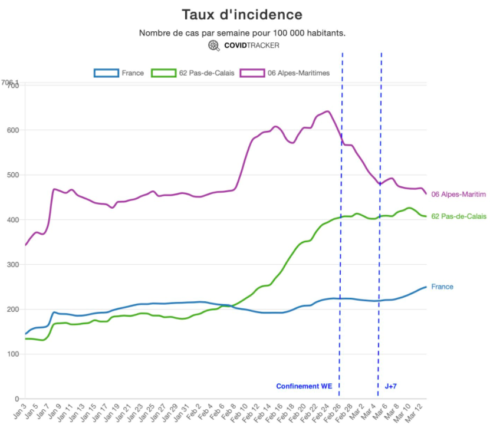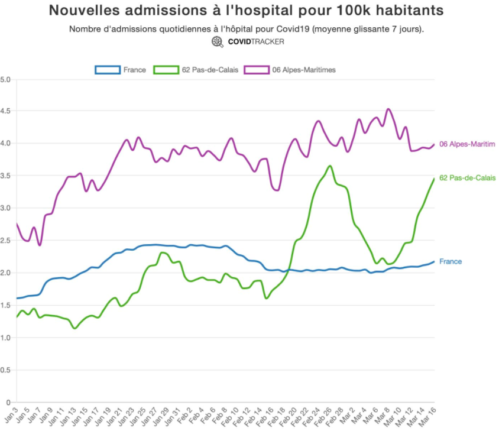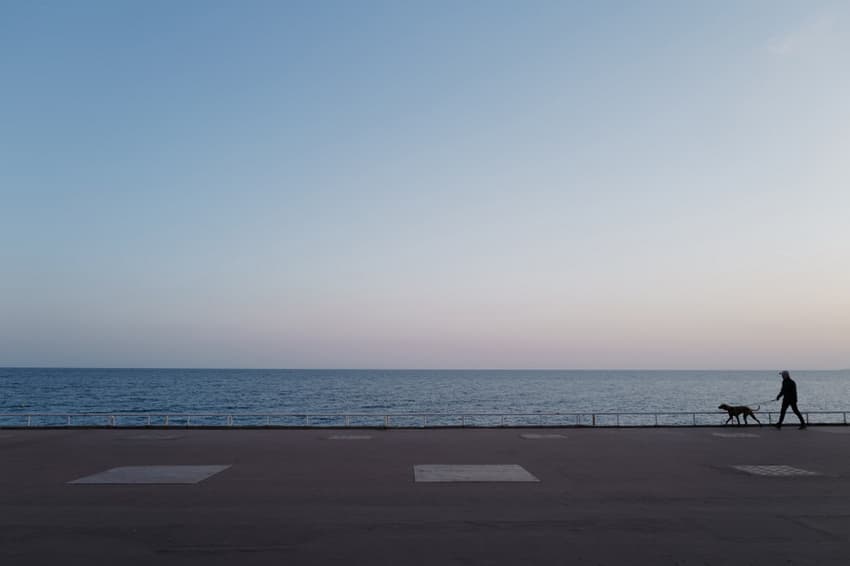Macron and his government have been holding talks all week in order to decide whether to extend a weekend lockdown to the Paris region and other hard-hit areas, or whether to opt for other measures to slow down the epidemic spread.
UPDATE: What new Covid restrictions will Macron decide to take in France?
So far three areas of France have been placed under a weekend lockdown: Nice and a large stretch of the French Riviera, the northern town of Dunkirk and the Pas-de-Calais département, a bit further south.
The weekend lockdown imposes a complete ‘stay home’ order at the weekend, with only essential trips out of the home allowed and attestations needed for all trips. The 6pm-6am curfew remains in place during the week.
READ ALSO What are the rules for the parts of France on weekend lockdown?
Advertisement
But how effective are these measures?
Initial results are encouraging, albeit modest.
Three and a half weeks since the first lockdown weekend entered into effect in the Alpes-Maritimes département encompassing Nice and the French Riviera, the incidence rate has dropped from nearing 530 new cases per 100,000 inhabitants to 446.7, according to the latest public health data.
In Pas-de-Calais, where the measure was imposed a week later, the incidence rate is still rising but has slowed down its rise and is currently at 407.4 new cases per 100,000 inhabitants.
The graphic below illustrates the change in these two départements' incidence rates compared to the rest of France.

Graphic: Guillaume Rozier, CovidTracker
The rather steep drop in Alpes-Maritimes began around February 20th, before the first weekend lockdown, which seemingly indicates that the drop preceded the new measure.
However when controlling for the number of tests, which increased over the same period, the data shows a visible drop in the week that followed the first seven days after the first weekend lockdown in the areas of Alpes-Maritimes, indicating that the measure did have an impact.
https://twitter.com/GuillaumeRozier/status/1372178238026420225
In Dunkirk, which imposed a weekend lockdown at the same time as Nice and the 62 other towns and cities in Alpes-Maritimes, the incidence rate has also dropped over the same period.
While Public health agency Santé Publique France does not publish exact incidence rates on a town or commune level, the latest estimates provided by local authorities put the rate at 673, down from over 1,000 before the first weekend lockdown.
Advertisement
What about hospitals?
Hospital occupancy rates remain pretty much unchanged, according to French data scientist Guillaume Rozier.
"Perhaps (they are) decreasing slightly," Rozier said in a tweet, but "the curve is too unstable to draw conclusions."

Graphic: Guillaume Rozier, CovidTracker
Alpes-Maritimes, Dunkirk and Pas-de-Calais this week all reported high intensive care ward occupancy rates of 111 per cent, 100 percent and 120 percent respectively, meaning Covid patients effectively had filled up their ICUs.
Previous stages of the epidemic have shown that the impact on hospital occupancy usually comes several weeks after case numbers begin to fall, which means that the weekend lockdown could soon alleviate pressure on hospitals in the areas concerned.
However it seems clear that this is not a ‘quick fix’ solution.
The Paris region has incidence rates approaching 500 in several départements, of which suburb Seine-Saint-Denis reported the worst of all: 505.8 new cases per 100,000 inhabitants on March 14th, according to the latest data published.
Hospitals in the area are also under severe pressure, with non-emergency surgery cancelled and some seriously ill patients transferred to other regions.
President Macron hinted on Wednesday that a weekend lockdown might not be the best suited measure in Île-de-France, where commuters travel regularly between Paris with its suburbs and where many - especially in poverty-stricken areas like some parts of Seine-Saint-Denis - live in small apartments without access to a garden or greenery nearby.
The other option apparently under consideration is a short but complete lockdown. This measure has so far not been tried in France - the first and second lockdowns were nationwide and lasted two months and six weeks respectively, so it is hard to know how effective a short, regional lockdown would be.



Join the conversation in our comments section below. Share your own views and experience and if you have a question or suggestion for our journalists then email us at [email protected].
Please keep comments civil, constructive and on topic – and make sure to read our terms of use before getting involved.
Please log in here to leave a comment.